News
How Boko Haram Member Defiled Me At Age of Nine
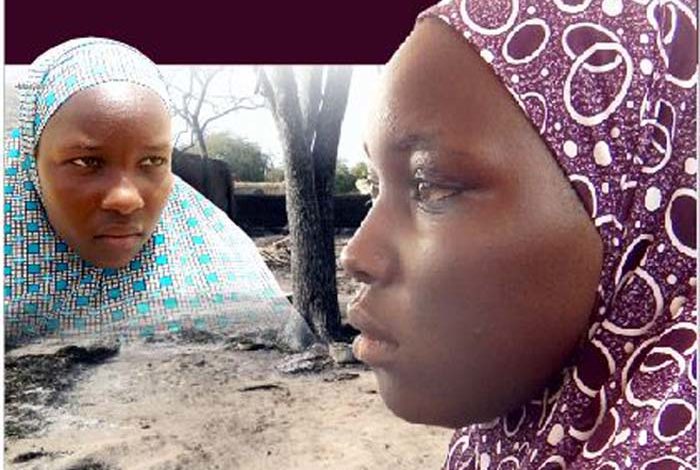
Stolen, bruised, raped: Borno girls recount horrid spells in Sambisa Forest How Boko Haram transformed them from innocent girls into sex slaves and suicide bombers
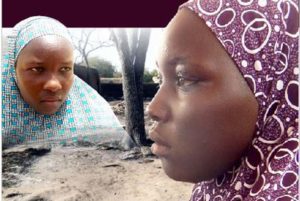
The girl died in Maryam Alhaji-Wakil on a sunlit afternoon in Bama. That fateful day in 2014, insurgents of the deadly terrorist sect, Jama’atul ahl al-sunnah li da’awati wal jihad (JAS) a.k.a Boko Haram, invaded her town and burnt her home. They killed her relatives and decapitated her neighbours. Then they abducted her. She was nine years old. Maryam
Maryam’s abductors whisked her to Sambisa Forest, their terror enclave. There, she was forcibly married to Modu, a ‘violent’ member of the sect. Hence in two days, little Maryam was violently thrust into womanhood. Modu, 35, forced his way into her unripe orifice, robbing her of innocence and the mystic pleasure of first adult sexual experience. Modu was hasty and rough thus making her ‘first time’ bestial and replete with pain. She screamed in agony but Modu didn’t care. “The louder I screamed, the more violently he shoved into me until I passed out.”
When she came to, the nine-year-old from Bama had transformed into a broken woman in the corpse of a child.
Maryam remembers Sambisa Forest like a purgatory for sins her nine-year-old heart could make no sense of. “I didn’t do anything wrong. I was playing with my friends when they came to kidnap me,” she said. Speaking exclusively with The Nation in Maiduguri, sullenness crept into her eyes, rendering it weary and wan in split seconds. “They stormed our village at noon. They shot and stabbed at everybody in sight. They lined up our neighbours and killed them. In the mayhem, I could not find my parents. I heard they escaped before Boko Haram could kill them,” disclosed Maryam.
As she recounted her grisly past, her tired gaze burned into some mythic distance. Her shiny eyelids blinked as if to shut out her dismal past. But she couldn’t. Vignettes of blood and hastily carved corpses stole from her lips into the air. The effect was numbing, spine-chilling to be precise. Bitterness bulged from convulsive theatres of blood that brutally marred her past, into the russet radiance of the day.
“They forced me to marry Modu. He was a nasty man. He forced himself on me. He raped me. He was a very mean man,” revealed Maryam.
Life as Modu’s wife was hellish. Modu was a very poor man. He was an ordinary foot soldier of Boko Haram, hence unlike the sect’s commanding officers, he had no means to cater for his wife but he aggressively sought to assert his conjugal rights.
Maryam relived the excruciating nights that she laid captive and helpless under his massive bulk while he plowed into her. “Because I was an unwilling bride, he always raped me,” revealed Maryam. Reprieve, however, came her way two weeks into her marriage with Modu; in the wake of Boko Haram’s feverish recruitment of underage girls as suicide bombers, Maryam volunteered to serve as one of the terrorist sect’s agents of death.
Predictably, Modu flew into a rage. “He didn’t want me to do it but he was too proud to beg me. So, he divorced me. He said, ‘Good riddance to bad rubbish. I don’t need you again anyway. Go and die.’ But I didn’t care because I had achieved my wish. I was getting out of the marriage. I was leaving Sambisa,” she said.
‘They forced me to marry Modu. He was a nasty man. He forced himself on me. He raped me. He was a very mean man… Because I was an unwilling bride, he always raped me’
Thus Maryam was dispatched with a bomb to neighbouring Cameroon. She was taken on a motorcycle to blow up any soft target military post in Mainana, Cameroon. But Maryam had other plans.
“When the rider dropped me, I approached the soldiers and told them, ‘I have this thing on my body. It is a bomb. I was sent to kill you. Please, help me remove it,” she said. Instantly, the soldiers sprung into defensive position but realising that she had come to surrender, they approached her and unstrapped the explosive from her body.
Maryam spent several months in the custody of the Cameroonian gendarmes until she was handed over to the Nigerian military.
Hard as it was to picture the extent of bitterness devastating Maryam’s heart, an intense gape into her eyes indicated a girl utterly torn apart. Beneath her pretty face lurks a battered soul. Now 12 years of age, Maryam is yet to break out the jailhouse of her past. She is still the starry-eyed nine-year-old that got whisked off to Sambisa Forest, while her relatives and neighbours fell in a bloody heap, to the bullets of Boko Haram’s terror squads.
The 12-year-old girl recounted with grief and a mien that suggested, among other things, a visceral lust for vengeance, her ordeal in captivity of Boko Haram. Then she fell silent, staring ardently into the distance. It was a macabre silence replete with spasms of blood-curdling angst, misery and discontent, three-years old.
Like Maryam, Aishatu Buba’s pain transcends the passing tribute of a sigh. Buba married her husband, Ba’ana, in 2005. She was eight years old. But she was abducted three years ago from Bama, just after she turned 17, by Boko Haram.
Until Boko Haram stormed her home in Bama, Buba lived in peace with her husband and two-year-old son, Shettima. But no sooner did the terrorists invade her neighbourhood than her world crumbled. Foot soldiers of the group snatched Buba from her home and whisked her away to Sambisa along with other abductees. They took her away with her infant son.
In Sambisa Forest, Buba was forcibly remarried to Momodu, an infantry soldier of Boko Haram. Momodu, like several of his peers, had no means of catering to his new wife and stepson’s needs.
“Momodu was a very poor man. He couldn’t take care of me. He could not even feed me and my son. All he knew how to do is to sleep with me. Because of the harsh conditions in Sambisa Forest, my son, Shettima, died barely six months after our abduction. He died of dehydration and malnutrition. The hardship was too much for an infant. When he died, I was heartbroken, but Momodu didn’t care.
“I am not sure my first husband is alive. One year after I was taken to Sambisa, Momodu went on a raid and he came back to tell me that they had killed everyone in Bama. He told me Ba’ana was one of the casualties. He said they killed them all and dumped them in a well,” she said.
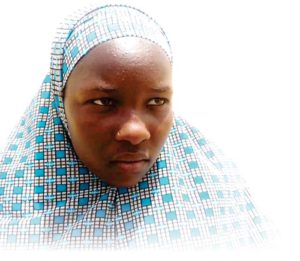
Buba said her captors returned to Sambisa Forest to rejoice. “When the Nigerian Army approached to dislodge them, their commander instructed them ‘Kill them all!’ He told them to kill everybody in sight. So they killed my people in Bama and dumped them in a well,” lamented Buba.
Despite the harsh realities of being Momodu’s wife, Buba couldn’t prevent him from sleeping with her. Thus besides keeping her hungry and subjecting her to incessant sexual and physical abuse, Momodu got her pregnant.
By the time she was rescued from Sambisa Forest, Buba was with Momodu’s child, a six-month-old infant girl. She named her Fatima.
Bama: Boko Haram carried out most of its abductions and carnage in the township
Being Fatima’s mother…Playing mom to a child born of rape
Fatima reminds Buba of a past she would rather forget. Every day, she struggles to renew her resolve to love the infant girl. It’s so hard to love the child whose father, Momodu, abducted her from her home in Bama, killed her husband and starved her first son, Shettima, to death.
Until she put to bed, Buba dreamt of ripping her belly apart to rid it of the child whose immense bulk tilted her wiry frame forward as if she would keel over. But she couldn’t. She silently bore the pains and demands of pregnancy on her lean body. At full term, she viewed her unborn child like a vulgar cyst, jutting from her belly, impeding her steps.
But no sooner did she put to bed than the revulsion she felt vanished from her heart. “At first, it was so hard to love her. There were times I wished she would come out stillborn but immediately I set my eyes on her, the rage I felt vanished from my heart. I fell in love with her. Right there, I named her Fatima,” said Buba.
But that momentary surge of love vanished sooner than she imagined. To Buba’s chagrin, as Fatima grows, she reminds her of realities she would rather erase from her memory and past.
“It’s so hard to love her. I have been constantly scorned and abused because of her. My people abuse me for keeping her. They blame me for getting pregnant for a Boko Haram soldier. But it’s not my fault. Who wishes to get abducted, beaten and raped by a terrorist? I never wished to have a child for Momodu but it is Allah’s will. What am I to do?” said Buba.
Where children are Annoba (Epidemic)
Far from the ugliness of their world, a different kind of cruelty is meted out to an eight-month-old and his mom. His name is Abuya. This minute, Abuya grows into a boy. The eight-month-old is different from what he looked like when the midwife took delivery of him from Ba Amsa, his mother, on Dalora refugee camp. Ba Amsa, 18, welcomed him with mixed feelings. Every day unfurled as a fresh struggle to accept Abuya. But she is learning to love him, even as you read.
She dreads the day he will begin to ask why the neighbours call him ‘Bad blood.’ She is terrified of the moment that Abuya would ask why they call his mother ‘vampire’ and “Annoba,” (epidemic).
Ba Amsa will respond in pain. She will couch the sordid details of his conception and birth in a clutter of woe and earnest tears. Despite her anguish, she would tell her son to ignore the neighbours’ hatred and unkind words. She would probably tell him that there is a garden in his face where roses and white lilies grow. She would never call him the living proof of her shame.
“This child does not even know of its own existence…so he has no blame. All the bad things that happened to me are because of his father, not him. This child is innocent,” said Ba Amsa.
On Ba Amsa’s due date, she went into labour with hostile feelings, in a hostile environment. Before she put to bed, Ba Amsa dreaded that her child would become a burden to her. Now that she has put to bed, the 18-year-old regrets that her beautiful child is born to strife and ugliness.
‘Momodu was a very poor man. He couldn’t take care of me. He could not even feed me and my son. All he knew how to do was to sleep with me. Because of the harsh conditions in Sambisa Forest, my son, Shettima, died barely six months after our abduction. He died of dehydration and malnutrition…’
“Children are like flowers. They are like roses. Roses are poisoned with ugliness. The situation in the northeast is too ugly to raise a child. Life here is very ugly. Very, very ugly for the Nigerian child,” lamented Halima Sule, a Borno-based social health worker.
Indeed, no child should be born into ugliness. Not Abuya, Fatima or any other child. But the eight-month-old was sired in pain and utmost cruelty. Ask his teenage mom. Due to a limp she suffered as a result of childhood polio, she couldn’t run fast enough to escape when the dreaded terrorist sect, Boko Haram, stormed her neighbourhood in Bama, in September 2014.
They abducted her and her sister and took them to an improvised women’s prison for three months. “They would tell us, ‘Men are coming to look at you,’ and told us to stand up and show our breasts, then they would pick five or 10 of us. More than 20 had been taken away before they came for me. You couldn’t resist, because the men were armed with guns, and if you did, they took you to the bush and killed you.”
The man who picked her was someone she knew from Bama and they stayed in a house in the village. “He was under 30 and didn’t seem to know anything about religion…I couldn’t resist him, he was armed,” said Ba Amsa.
When the Nigerian Army recaptured Bama, Ba Amsa was pregnant. This time she managed to get away. Her son, Abuya, now eight months old, was born in the camp and she was reunited with her parents. Her four siblings – three brothers and a sister – are still missing. Ba Amsa said she is lucky because her family still supports her but she would give anything to change the tide of public opinion about her and her infant son, Abuya.
There is no gainsaying the fact that she nurses her baby in an hostile environment – both mother and child endure each day on the Dalori refugee camp.
Source: The Nation
-

 Opinion5 days ago
Opinion5 days agoEthical And Public Health Implications Of Engonga’s Alleged Actions In E’Guinea And Hypothetical Projection For Nigeria By Shina Adewoye
-

 News4 days ago
News4 days agoStop Using Unfortunate Loss Of Lagbaja To Play Your ‘Usual Irresponsible Politics’, Osun PDP Warns APC
-

 News2 days ago
News2 days agoNurudeen Islamic Mission Mourns Death Of National Leader, Alhaji Abdulazeez Orelope
-
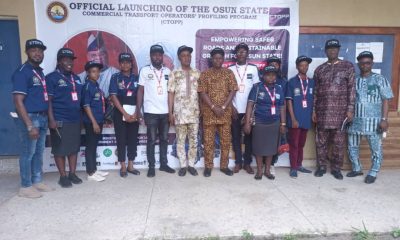
 News2 days ago
News2 days agoSafety Of Commutters: Gov Adeleke Flags-off Profiling Of Transport Operators



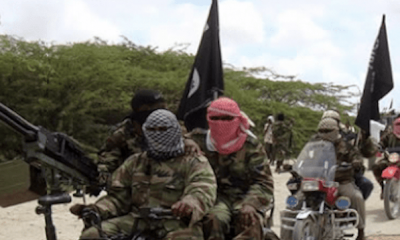



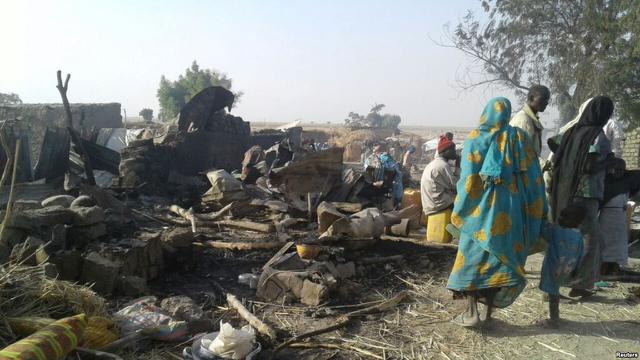
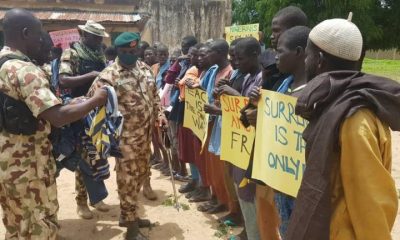

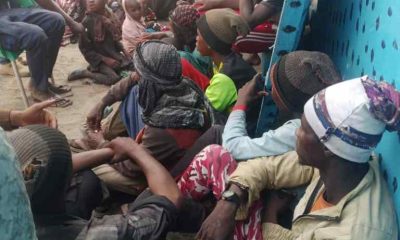



16 Comments